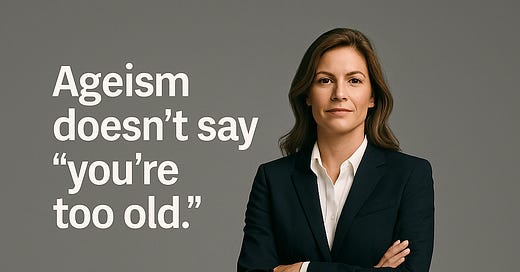It started with a job posting.
A People Leader role.
And tucked into the fine print:
“Candidates from recruitment agencies, staffing firms, or HR consulting backgrounds will not be considered.”
It wasn’t subtle.
Someone in a people-first profession wrote that—codifying a weird kind of exclusion, in black and white, for the Wayback Machine.
For a leader of people role.
Wild.
(And that’s the polite version of my first reaction.)
Still—it surprised me.
Maybe because I’m one of the people it targets.
And maybe because I tend to wander into job posts, even when I’m not looking.
But this one hit a nerve.
A little déjà vu. A little you’ve got to be kidding me.
Because discrimination doesn’t usually come in all caps.
It comes in coded words.
In formats.
And in ageism.
In that uncanny moment when “too much experience” becomes a red flag.
So here’s the question:
Why do we tolerate bias. Especially in an era that prides itself on naming it?
Ageism is already institutional.
Not because people are malicious.
Because systems are dated.
And automated. Repeated. Reinforced.
It lives in our culture, language.
In our templates.
In the advice we give without questioning where it came from.
That same week, I saw two posts claiming to fight ageism in hiring. Their solutions?
Drop the dates from your education.
Leave off early roles.
Use a modern format. Add a pop of color.
None of that’s wrong.
But let’s be honest—it doesn’t solve the problem.
It sidesteps it.
I’ve given that advice.
Because I know how the system reads experience past a certain point:
As too much.
As dated.
As age.
As old.
But that performance has a cost.
For the candidate, and for the system that keeps pretending age = obsolescence.
And some of the people meant to protect fairness?
They’re often the ones reinforcing this bias.
Not intentionally. Not even consciously.
Just routinely.
Through inherited playbooks.
Through over-filtered algorithms.
Through the slow creep of what’s “normal.”
So we land in this contradiction:
A push for diversity paired with a narrowing of who’s seen as viable.
A celebration of experience, just not too much of it.
A call for authenticity while rewarding those who mask what makes them different.
And then there’s culture fit—
The softest-sounding filter with the sharpest edge.
Too often, it’s just code for:
familiar, comfortable, young, like me.
Which is another way of saying:
Not you. Not anymore.
I wrote this to name what too many people feel, and too few say out loud.
Because experience doesn’t need editing.
It needs respect.
And no, I won’t stop helping people navigate the system.
But I’ll keep reminding them:
The system itself is broken. Only we can fix it.
And sometimes the most radical thing you can do is just…
say it.
I write about leadership, language, and the forces shaping careers today, especially the ones we don’t talk about enough. If you’re navigating a career move, leading a hiring team, or trying to reconcile your experience with a system that doesn’t always value it, I help people do that -on both sides of the table.






This was a solid read. I'd be happy to recommend your work. If you're up for mutual Substack recommendation, happy to chat—just drop me a DM.
I'm with you, Ken!! Thank you for this article. It got me fired up for the day!!